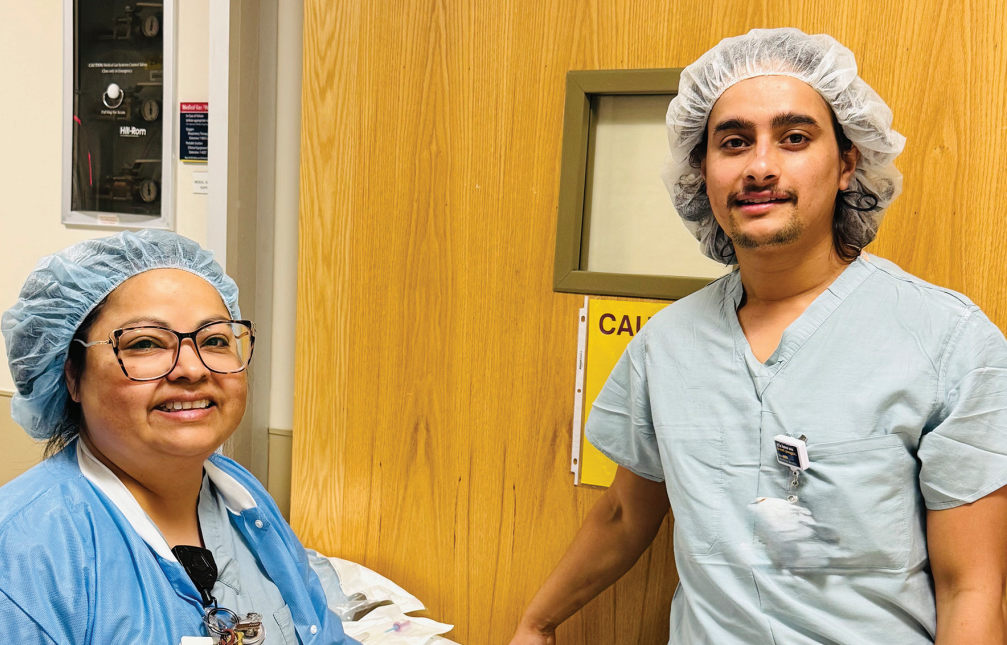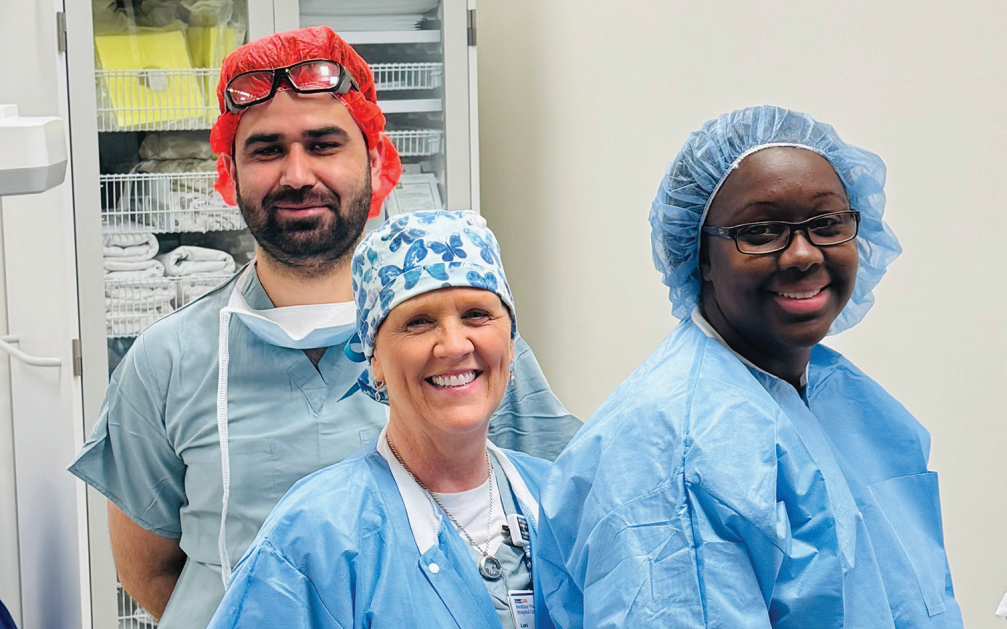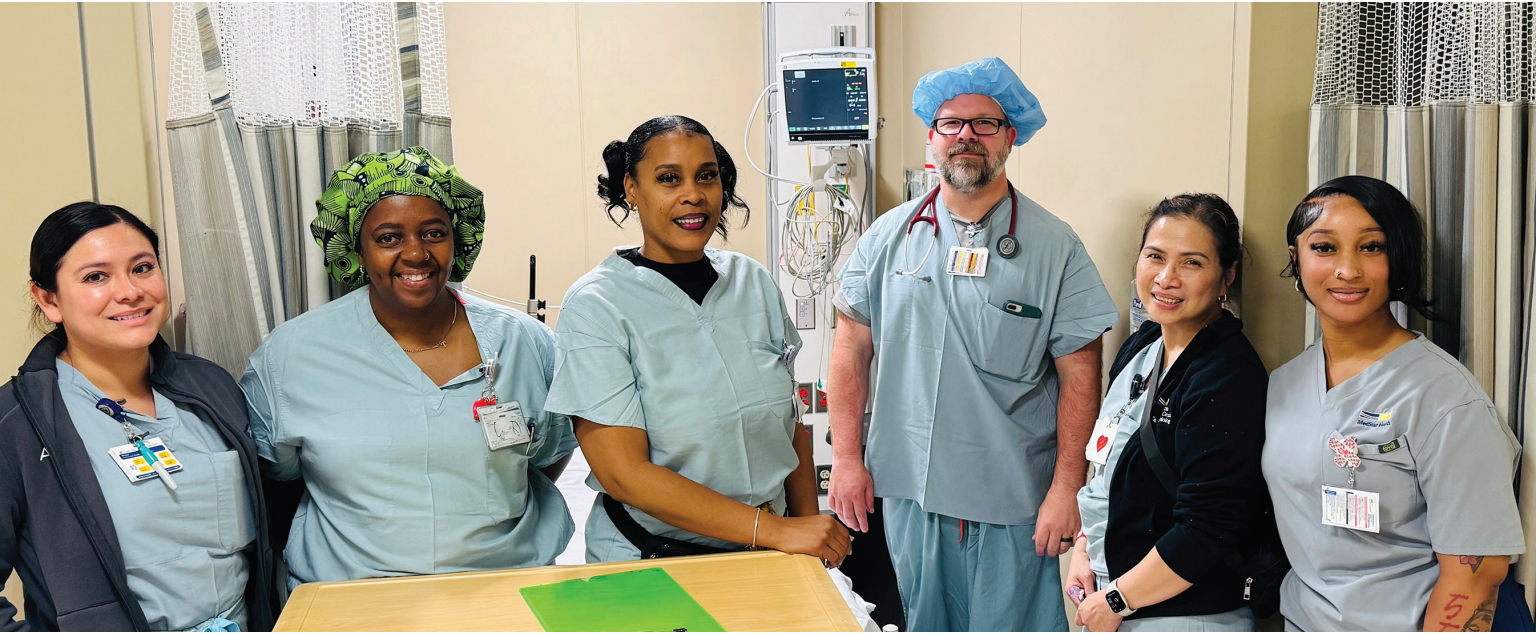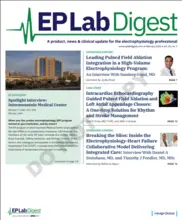Leadership in Action: Enhancing Electrophysiology Labs to Improve Patient Outcomes
Insights From Bonnie Bosler, RN, BSN, MSA, CCRN-K
Insights From Bonnie Bosler, RN, BSN, MSA, CCRN-K
© 2025 HMP Global. All Rights Reserved.
Any views and opinions expressed are those of the author(s) and/or participants and do not necessarily reflect the views, policy, or position of EP Lab Digest or HMP Global, their employees, and affiliates.
EP LAB DIGEST. 2025;25(8):16-18.
Bonnie Bosler, RN, BSN, MSA, CCRN-K1; Maggie Hartman2; Gina Donnelly3
1Regional Administrative Director of EP Labs, MedStar Heart & Vascular Institute, MedStar Washington Hospital Center, Washington, DC; 2Marketing Manager, Corazon; 3Vice President, Corazon
Electrophysiology (EP) labs play a crucial role in diagnosing and treating heart rhythm disorders, and their efficient operation is vital for patient care. Bonnie Bosler, the Regional Administrative Director of EP Labs at MedStar Heart & Vascular Institute at MedStar Washington Hospital Center, shares her insights into the importance of EP services in hospitals, her leadership strategies, and the initiatives that have driven improvements in patient outcomes.
Bonnie has dedicated her career to advancing EP services, ensuring that patients receive the highest quality care. Her role involves overseeing the daily operations of EP labs, fostering collaboration among staff, and implementing strategies to enhance efficiency and patient safety.

Background
Bonnie’s journey in nursing has been both unique and deeply fulfilling, shaped by incredible opportunities in both civilian and military settings. She graduated with a Bachelor of Science in Nursing in the early 1990s and began her career in a medical intensive care unit at a cardiac specialty hospital. This experience laid the foundation for her passion for cardiology and critical care. A few years into her nursing career, Bonnie served in the United States Air Force Reserves as a flight nurse, which challenged her to grow as a leader. Over the past 30+ years in nursing and 28 years in the Air Force, these career paths have complemented each other, enabling her to develop expertise in EP while honing her leadership skills.
Bonnie’s leadership in EP is driven by a commitment to excellence, lifelong learning, and service. Her roles have included bedside nurse, charge nurse, assistant nurse manager, director of the Cath/EP lab, regional director of the EP lab, flight nurse instructor/evaluator, chief nurse, commander, and mobilization assistant. Each position reinforced her passion for patient care, innovation in cardiac EP, and mentoring future health care leaders.
Leading an EP program requires a combination of clinical expertise, operational insight, and strong leadership qualities.
What are the key qualities and skills that you believe are essential for a strong leader in an EP program?
 Bonnie Bosler: Leading an EP program requires a combination of clinical expertise, operational insight, and strong leadership qualities to ensure safe, high-quality patient care and a well-functioning team. Essential qualities include strong clinical and technical knowledge, leadership and team development, commitment to patient safety and quality, effective communication and collaboration, adaptability and problem-solving, strategic and operational vision, emotional intelligence and resilience, and a passion for innovation and continuous improvement.
Bonnie Bosler: Leading an EP program requires a combination of clinical expertise, operational insight, and strong leadership qualities to ensure safe, high-quality patient care and a well-functioning team. Essential qualities include strong clinical and technical knowledge, leadership and team development, commitment to patient safety and quality, effective communication and collaboration, adaptability and problem-solving, strategic and operational vision, emotional intelligence and resilience, and a passion for innovation and continuous improvement.
A Day in the Life of an EP Lab Director and the Importance of a Strong Team Culture
Bonnie and her team’s day begins early, with a focus on operational oversight and real-time problem-solving. Her responsibilities include attending leadership meetings, collaborating with MedStar Health teams, and providing support to the EP team. Bonnie emphasizes the importance of patient safety and associate well-being, maintaining a supportive work environment to deliver excellent care.
Creating a collaborative environment in EP labs is essential for ensuring the highest quality and safest patient care, operational efficiency, and team satisfaction. Bonnie believes that a strong team culture is built on communication, mutual respect, and shared goals. Bonnie’s strategies for fostering collaboration include open and transparent communication, interdisciplinary teamwork and inclusion, education and training, collaborative problem-solving, recognizing and celebrating contributions, and encouraging a culture of safety and support. Regular huddles and check-ins align on patient cases, address concerns, and anticipate potential challenges. Training sessions and case reviews enhance teamwork and ensure all staff understand each other’s roles. Recognizing the hard work of team members reinforces a positive and motivated work environment, while promoting work-life balance and mental well-being ensures staff feel supported both professionally and personally.

Can you describe your role and what your day-to-day responsibilities entail?
Bonnie Bosler: As the Regional Administrative Director of EP Labs, my role revolves around 3 key priorities: our associates, our team, and our patients. Each day is dynamic, requiring a balance of operational oversight, leadership engagement, and real-time problem-solving to ensure seamless patient care. My day begins before 06:45 AM in the holding area, where I connect with the resource nurse and physician of the day to discuss any inpatient add-ons, ensuring that we are prepared to accommodate additional procedures while maintaining efficiency. Once the first cases begin at 07:30 AM, my responsibilities shift to a combination of leadership, collaboration, and operational management.
Improving Patient Outcomes and Feedback, Quality Improvement, and Ensuring High Standards
The EP lab team has implemented several initiatives to improve patient outcomes in the EP labs. These include enhancing “First Case On Time” starts, optimizing lab operations, and strengthening collaboration with Anesthesia. A key advancement has been the implementation of a specialized emergency code to alert the cardiac surgery team when signs of cardiac tamponade are observed.
These initiatives have had a significant impact on patient outcomes and safety. The “First Case On Time” starts have become standard practice, enhancing daily workflow efficiency and optimizing lab operations. Collaboration with Anesthesia ensures both efficiency and safety while delivering exceptional patient care. The specialized emergency code promptly mobilizes the EP team, cardiac surgeon, surgical assistant, operating room nurse, perfusionists, cardiac interventionist, and surgical intensive care unit attending, improving emergency response and patient outcomes.
Patient feedback is also a critical factor in management of the EP labs, helping to identify strengths, areas for improvement, and opportunities to enhance the patient experience. Bonnie’s team has started mailing personalized thank-you cards and is working with the Office of Patient Experience to explore other methods to improve patient experience in the EP lab space.
Finally, maintaining high standards of quality and patient care in EP labs is a team effort. Bonnie emphasizes the importance of strong leadership, collaboration, open communication, standardized protocols, ongoing education, and performance monitoring.

How do you ensure that the EP labs under your supervision maintain high standards of quality and patient care?
Bonnie Bosler: Maintaining high standards of quality and patient care in the EP labs is a team effort. We rely on the expertise, dedication, and collaboration of our entire EP lab team to uphold excellence in patient safety, efficiency, and outcomes. As part of a High-Reliability Organization (HRO), our focus is always on patient safety and continuous improvement. This means fostering a culture where every team member—from leadership to frontline staff—has a voice in consistently driving safe, high-quality care.
Challenges, Innovations, and Successful Initiatives
Bonnie and her team face challenges in their role but stay updated on EP advancements through collaboration, ongoing education, technology adoption, data-driven decisions, and promoting innovation.
One of the most impactful initiatives led by Bonnie and her team was the implementation of a strategic staffing model and the enhancement of hiring and development practices for cardiovascular technologists. These initiatives significantly improved workflow efficiency, patient safety, and overall team performance.
These initiatives have strengthened the EP lab’s workforce and operational efficiency, elevating the quality of care provided to patients. Optimized staffing assignments and structured orientation and education programs have led to smoother daily operations, improved patient care, and a stronger team culture.
Can you discuss any challenges you have faced in your role and how you have overcome them?
Bonnie Bosler: Balancing administrative responsibilities with clinical engagement is essential to ensure that leadership decisions align with patient care and workflow efficiency. My approach is rooted in the HRO principle of “deference to expertise,” meaning I rely on the clinical EP expertise of key team members while staying actively engaged in the EP lab’s daily operations.
How do you stay updated with the latest advancements and technologies in EP, and how do you integrate them into the labs?
Bonnie Bosler: Staying ahead in EP requires a proactive approach to learning, collaboration, and strategic planning. The EP lab team focuses on collaborating with our Physician Executive Director, regular discussions with industry representatives, continuous education and professional development, strategic technology adoption and implementation, data-driven decision making, and fostering a culture of innovation.
Conclusion
Bonnie and the EP lab team’s leadership in EP at MedStar Heart & Vascular Institute at MedStar Washington Hospital Center exemplifies the importance of dedication, collaboration, and continuous improvement in health care. Her insights and strategies provide valuable lessons for anyone looking to enhance patient care and operational efficiency in EP labs.
Additionally, Corazon’s role in building key services like EP is crucial. Corazon’s support and strategic direction is instrumental in advancing the capabilities and impact of EP labs, ensuring that they remain at the forefront of innovation and patient care.
For more information on Bonnie’s role or Corazon’s services, contact us at 412-364-8200. 
To reach the authors, email maggie.hartman@corazoninc.com.
Disclosure: The authors have completed and returned the ICMJE Form for Disclosure of Potential Conflicts of Interest, and have no conflicts of interest to report regarding the content herein. Ms Bosler reports grants or contracts from any entity from Biosense Webster/Johnson & Johnson Consulting.












